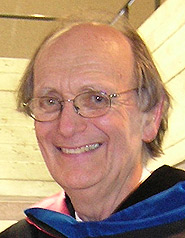Berkeleyan
Obituary
Allan Pred
![]()
17 January 2007
 |
Allan Richard Pred, one of the world's leading geographers and social scientists, died of acute lung cancer on Jan. 5 at Alta Bates Medical Center. He was 70.
Pred, a professor of geography here for 45 years, retired in May 2006 and was diagnosed with cancer a few months later.
"Allan Pred was a formidable intellectual, a great humanist, a loyal and trusted friend, and a generous and engaged mentor," said Michael Watts, professor of geography and director of the campus Institute of International Studies. "He was the central figure in the making of a distinctive Berkeley approach to geography over the last generation, and he left an indelible stamp on our department, marked by his devotion to wide-open inquiry, critical thought, and a passion for truth and human freedom."
For the better part of four decades, Pred was at the forefront of human geography, Watts said. His scholarship radically shaped today's understanding of city development, landscape, modernity, and race. His productivity was legendary - 22 books and monographs translated into seven languages, and more than 70 articles and book chapters - and he was among the most cited scholars in the profession.
At the time of his death he was completing a new book manuscript, continuing his interest in race, identity, and the making of the modern world.
A tireless campaigner for geography as a field of study, Pred promoted the importance of space and place in everyday life. Space, in his view, was a sort of foundation stone for all of the human sciences. Seeing, measuring, perceiving, and creating space was, Pred wrote, central to the birth of modernity.
Pred was born in the Bronx in 1936, the grandson of Jewish immigrants from Poland. In 1953, at age 16, he entered Ohio's Antioch College. He graduated first in his class in 1957 and enrolled in Pennsylvania State University to study geography. He soon moved to the University of Chicago, home to a long line of urban theorists, and by 1960 the crucible within which a new quantitative and analytical geography was being forged.
After completing his Ph.D. in 1962, the 25-year-old Pred joined the Berkeley faculty. Within five years he had obtained tenure, and by age 34 he had been appointed full professor.
Pred started his career as a theorist of the American city, establishing his international reputation with three groundbreaking and influential books on 19th-century U.S. urbanism published between 1966 and 1980. He challenged the new economic historians to take seriously the role of urban agglomeration in industrial growth; emphasized the role of growing communications networks in national growth, mercantile expansion, and industrial innovation; and charted the way capitalist dynamics ramify across the entire city system, more than between cities and rural hinterlands.
Drawn to Sweden
While still a graduate student at the University of Chicago, Pred began a life-long love affair with Sweden, drawn, in part, from the theoretical and scientific innovations of Swedish geographers such as Torsten Hagerstrand. Beginning in the 1980s, Pred focused on the Swedish city, mining a treasure trove of neglected church and state papers on 19th- and 20th-century life. What followed was a series of projects designed to unearth the making of place, everyday life, and popular identities in the transition to what he called "Swedish modern." In two powerful and controversial books - his stunning excoriation of cultural racism, Even in Sweden: Racisms, Racialized Spaces, and the Popular Geographical Imagination (2000), and The Past is Not Dead: Facts, Fictions and Enduring Racial Stereotypes (2004) - Pred exposed a deep vein of pain and shame.
Pred was awarded the Anders Retzius Medal - sometimes called geography's Nobel Prize - by the Swedish Society for Geography and Anthropology in 1991. He was honored twice by the Association of American Geographers, in 1978 and 2005. The latter year saw him elected a corresponding fellow of the British Academy and awarded special honors by the Association of American Geographers for his "stalwart leadership within the discipline" and "outstanding intellectual and personal ambassadorship ... throughout the international academy."
Pred served as the chair of the Department of Geography between 1979 and 1988. He was made a professor in the graduate school in 2005, a position in which he continued his research and mentoring of graduate students.
Pred is survived by his wife of 44 years, Hjordis Pred of Berkeley; daughter Michele Pred of Berkeley; and son Joseph Pred of San Francisco. He also leaves a brother, Ralph Pred of British Columbia; a sister, Suzanne Pred Bass of New York City; two nieces, Emily and Rebecca Bass; and a nephew, Noah Pred.
A campus memorial service will be held on Sunday, Jan. 28, at 2 p.m. in the Great Hall of the Faculty Club.
- Robert Sanders

